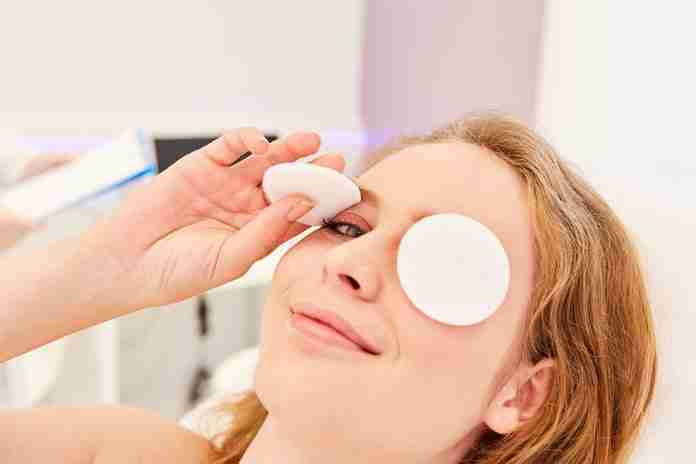Do Natural Remedies Help Blepharitis?

Most blepharitis cases can be treated by home remedies with simple home remedies. Prescription medications may be necessary in some instances. Some rare cases may need surgical intervention. Warm compresses to the eyelids and scrubbing them with baby shampoo may be helpful. The over-the-counter use of medicated eyelid washes can also help treat mild cases of blepharitis. (6)
Avoid eye makeup
Until the infection is under control or swelling is subsided, you should avoid eye makeup to reduce irritation. Clean the eyelids Rather than using a dirty cloth to clean each eyelid, use a new clean one. This will help prevent the spread of bacteria. Here’s what you can do
- Combine 50% baby shampoo with 50% water. Apply the soapy solution to your index finger using a warm, wet washcloth. Close the eye and rub the washcloth over the lid margins and lashes several times in horizontal motions.
- Use a clean, wet washcloth to thoroughly rinse
- Repeat the process for the other eye. In case several days of carefully cleaning your eyelids doesn’t reduce swelling, it’s time to schedule an appointment with your eye care provider.
Control dandruff and mites
If you have dandruff that contributes to your blepharitis, ask your doctor for a dandruff shampoo recommendation. You may be able to relieve your blepharitis symptoms by using a dandruff shampoo to cleanse your eyelashes. Applying tea tree oil shampoo to your eyelids daily might help with mites. Use over-the-counter tea tree oil to gently scrub your lids once a week. If you do not see improvement within six weeks, contact your physician. Those who experience skin or eye irritation should stop using tea tree oil.
Eye Compresses
Place a warm compress on the eyelid a few times a day as the first treatment for blepharitis. Wet a paper towel or washcloth with warm water to make an eye compress. Hold the compress on your eyelid for a few minutes or until it cools to room temperature. A warm teabag can also be used as an eye compress. After steeping, let the teabag cool so that it is not hot. Tea Bag compresses are not more effective than warm water. But because of their shape, they may be more convenient to use.
Eyelid Scrub
You should clean your eyelids with a gentle cleanser and water every day to keep bacteria levels low. For this purpose, baby shampoo works well because it is gentle and does not sting eyes. A specially formulated eyelid wash can also be used. Put a few drops of cleanser on a warm cloth and lather it up. Swipe the eyelid back and forth using a horizontal motion and close your eyes. After that, rinse your eyes. For best results, repeat twice daily after applying a warm compress. This will help relieve the symptoms of mild blepharitis.
Eyelid Washes
Over-the-counter eyelid washes that treat blepharitis are available. Using these cleansers can help clear up mild to moderate blepharitis and prevent further inflammation. Options may include;
- Avenova – Avenova contains 0.01% hypochlorous acid as an eyelid wash. The ingredient is clinically proven to treat blepharitis caused by bacteria.
Avenova should be applied with a cotton round or cotton ball. Then, wipe it across your eyelashes three times in a horizontal motion. Do the same with the other eye using a fresh cotton bud. Repeat twice daily.
- Cliradex – In Cliradex, the active ingredient is Melaleuca alternifolia, a form of tea tree oil with potent antiinflammatory properties that is used to treat blepharitis. Tea tree oil contains another antibacterial compound called 4-Terpineol that is clinically proven to ease the symptoms of blepharitis.
Use Cliradex wipes twice daily for ten days to treat blepharitis. Continue to use these wipes once a day for 10 more days if symptoms do not improve. It also works well to remove eye makeup and is safe to use everyday.
- Blephadex – Medicated wipes, such as Blephadex, are used to treat blepharitis caused by eyelash mites. Tea tree oil, coconut oil, and a gentle eyelid cleanser are included in the wipes. Researchers have found that tea tree oil can clear up blepharitis by reducing Demodex mites. Additionally, tea tree and coconut oils kill microorganisms like bacteria, viruses, and fungi – thus helpful in treating blepharitis caused by mites and bacteria both. The anti-inflammatory and pain-relieving properties of coconut oil are also helpful for treating blepharitis.
